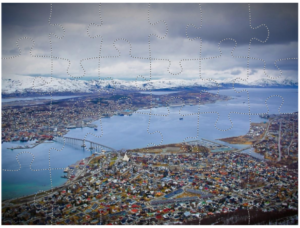
Like puzzle pieces, ideally, policies agreed upon at the local, national, regional, and global levels should contribute to a coherent whole. In reality, however, policy-making mirrors our world’s heterogeneities and contradictions. To bring different realities, perspectives, and ultimately policies together, transnational cooperation is crucial. A new research project launched in October 2020 and funded by the German Research Foundation (DFG) investigates whether a “look up north” to the Arctic, where transnational cooperation has a long tradition, may help to identify pathways to better harmonise policies particularly in the context of sustainable urban development. Two international and interdisciplinary research teams based at the German Development Institute / Deutsches Institut für Entwicklungspolitik (DIE) and the Maria-Curie-Skłodowska-University in Lublin, Poland, will collaborate for the next three years. A central result of the project “Sustainable Urban Development in the European Arctic (SUDEA): Towards Enhanced Transnational Cooperation in Remote Regions” will be a new framework to align and advance governance approaches also beyond the Arctic.
The researchers Dorothea Wehrmann (project lead, DIE), Michał Łuszczuk (project lead, Maria-Curie-Skłodowska-University), Katarzyna Radzik-Maruszak (Maria-Curie-Skłodowska-University), Arne Riedel (Ecologic Institute) and Jacqueline Götze (DIE) combine theoretical analyses with empirical studies and pay particular attention to seven cities located in the European Arctic: Rovaniemi and Kolari in Finland, Nuuk in Greenland, Akureyri in Iceland, Tromsø in Norway as well as Kiruna and Luleå in Sweden. The project is part of the Research Programme “Inter- and transnational cooperation” at DIE and will contribute to theoretical and conceptual debates also in the context of the research cluster “Success factors determining inter- and transnational cooperation”.
For further information, please check the project website.

Schreibe einen Kommentar